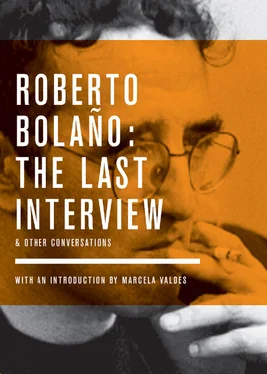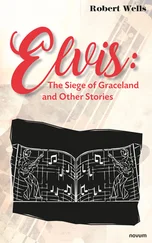CB:Right, I’m not going to tell you, and not because my answer would be any more convincing. But I must say that if there is some reason why I don’t write, it’s out of sensitivity. For me, writing means immersing myself in a war zone, slicing up bellies, contending with the remains of cadavers, then attempting to keep the combat field intact, still alive. And what you call “settling scores” seems much fiercer to me in your work than in that of many other Latin American writers.
In the eyes of this reader, your laughter is much more than a gesture; it’s far more corrosive — it’s a demolition job. In your books, the inner workings of the novel proceed in the classic manner: A fable, a fiction draws the reader in and at the same time makes him or her an accomplice in pulling apart the events in the background that you, the novelist, are narrating with extreme fidelity. But let’s leave that for now. No one who has read you could doubt your faith in writing. It’s the first thing that attracts the reader. Anyone who wants to find something other than writing in a book — for example, a sense of belonging, or being a member of a certain club or fellowship — will find no satisfaction in your novels or stories. And when I read you, I don’t look for history, the retelling of a more or less recent period in some corner of the world. Few writers engage the reader as well as you do with concrete scenes that could be inert, static passages in the hands of “realist” authors. If you belong to a tradition, what would you call it? Where are the roots of your genealogical tree, and in which direction do its branches grow?
RB:The truth is, I don’t believe all that much in writing. Starting with my own. Being a writer is pleasant — no, pleasant isn’t the word — it’s an activity that has its share of amusing moments, but I know of other things that are even more amusing, amusing in the same way that literature is for me. Holding up banks, for example. Or directing movies. Or being a gigolo. Or being a child again and playing on a more or less apocalyptic soccer team. Unfortunately, the child grows up, the bank robber is killed, the director runs out of money, the gigolo gets sick and then there’s no other choice but to write. For me, the word “writing” is the exact opposite of the word “waiting.” Instead of waiting, there is writing. Well, I’m probably wrong — it’s possible that writing is another form of waiting, of delaying things. I’d like to think otherwise. But, as I said, I’m probably wrong. As to my idea of a canon, I don’t know, it’s like everyone else’s — I’m almost embarrassed to tell you, it’s so obvious: Francisco de Aldana, Jorge Manrique, Cervantes, the chroniclers of the Indies, Sor Juana Inés de la Cruz, Fray Servando Teresa de Mier, Pedro Henríquez Ureña, Rubén Darío, Alfonso Reyes, Borges, just to name a few and without going beyond the realm of the Spanish language. Of course, I’d love to claim a literary past, a tradition, a very brief one, made up of only two or three writers (and maybe one single book), a dazzling tradition prone to amnesia, but on the one hand, I’m much too modest about my work and on the other, I’ve read too much (and too many books have made me happy) to indulge in such a ridiculous notion.
A sixteenth century poet, short story writer and soldier, Francisco de Aldana (1540–1578) was a favorite of Cervantes and an integral part of the Spanish Renaissance.
Spanish poet Jorge Manrique (1440–1479) is a major figure in Spanish literary history. Stanzas about the Death of his Father has been translated many times, including in an 1833 translation by Longfellow.
An immensely important and prolific poet, Sor Juana Inés de la Cruz (1651–1695) lived in Mexico under Spanish rule. Her work was overtly radical for her time. She was especially concerned with the education of women and is viewed as an early champion of feminism.
A Dominican friar born in Monterrey, Servando Teresa de Mier (1763–1827) was a prominent preacher and politician in pre-revolutionary Mexico. While exiled in Spain he wrote his seminal works and aided the cause of Mexican independence.
One of the first Hispanic writers to be read internationally, Pedro Henríquez Ureña (1884–1946) was a proponent of the power of language to incite social change. An academic and son of a Dominican president, he was one of the most important Latin American cultural theorists and historians of the twentieth century.
CB: Doesn’t it seem arbitrary to name as your literary ancestors authors who wrote exclusively in Spanish? Do you include yourself in the Hispanic tradition, in a separate current from other languages? If a large part of Latin American literature (especially prose) is engaged in a dialogue with other traditions, I would say this is doubly true in your case.
RB:I named authors who wrote in Spanish in order to limit the canon. Needless to say, I’m not one of those nationalist monsters who only reads what his native country produces. I’m interested in French literature, in Pascal, who could foresee his death, and in his struggle against melancholy, which to me seems more admirable now than ever before. Or the utopian naiveté of Fourier. And all the prose, typically anonymous, of courtly writers (some Mannerists and some anatomists) that somehow leads to the endless caverns of the Marquis de Sade. I’m also interested in American literature of the 1880s, especially Twain and Melville, and the poetry of Emily Dickinson and Whitman. As a teenager, I went through a phase when I only read Poe. Basically, I’m interested in Western literature, and I’m fairly familiar with all of it.
The most famous and acclaimed Nicaraguan poet, Rubén Darío (1867–1916) is credited with bringing modernism to Latin American literature.
A massive figure in Mexican culture in the first half of the twentieth century, Alfonso Reyes (1889–1959) was a prolific essayist, poet, and diplomat. He served as secretary of the Mexican embassy in Spain, minister to France, and ambassador to Brazil and Argentina. In 1943 he co-founded El Colegio Nacional in Mexico City. His major works include The Position of America and Other Essays (1950) and Mexico in a Nutshell and Other Essays (1964).
CB:You only read Poe? I think there was a very contagious Poe virus going around in our generation — he was our idol, and I can easily see you as an infected teenager. But I’m imagining you as a poet, and I want to turn to your narratives. Do you choose the plot, or does the plot chase after you? How do you choose — or how does the plot choose you? And if neither is true, then what happens? Pinochet’s adviser on Marxism, the highly respected Chilean literary critic you baptize Sebastián Urrutia Lacroix, a priest and member of the Opus Dei, or the healer who practices Mesmerism, or the teenage poets known as the Savage Detectives — all these characters of yours have an historical counterpart. Why is that?
RB:Yes, plots are a strange matter. I believe, even though there may be many exceptions, that at a certain moment a story chooses you and won’t leave you in peace. Fortunately, that’s not so important — the form, the structure, always belong to you, and without form or structure there’s no book, or at least in most cases that’s what happens. Let’s say the story and the plot arise by chance, that they belong to the realm of chance, that is, chaos, disorder, or to a realm that’s in constant turmoil (some call it apocalyptic). Form, on the other hand, is a choice made through intelligence, cunning and silence, all the weapons used by Ulysses in his battle against death. Form seeks an artifice; the story seeks a precipice. Or to use a metaphor from the Chilean countryside (a bad one, as you’ll see): It’s not that I don’t like precipices, but I prefer to see them from a bridge.
Читать дальше












